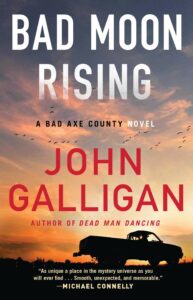The sun is out, the flowers are in bloom, the vaccines are flowing freely, and this summer, we all deserve to have some much-needed (and long-delayed) fun. With that in mind, this year’s summer reading preview is dedicated to the thrilling, the riveting, and the wildly creative, as we recommend 80+ books to keep you reading long past sunset (even on the Summer Solstice). Take these books to the beach, to the pool, on vacations, and on road trips—just don’t forget to get vaccinated first!
(Publication dates are subject to change. Please check bookshop.org for more info.)
___________________________________
MAY
___________________________________
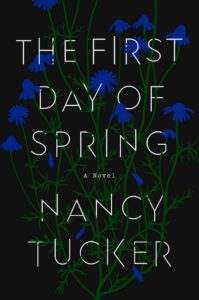
Nancy Tucker, The First Day of Spring
(Riverhead)
The First Day of Spring is a strange combination of heartwarming, disturbing, and devastating. It begins with a murder—8-year-old Chrissie has killed a small boy, her motives obscure, and her pleasure at the act unquestioned. Two decades later, Chrissie is living under a new name with her young daughter, whom Chrissie is terrified of losing. As we follow her on a desperate journey to her old haunting grounds, interspersed with slow reveals of horrific neglect suffered by Chrissie in her own childhood, we begin, perhaps, to understand her childhood act, and to see a path toward redemption. –Molly Odintz, CrimeReads Senior Editor
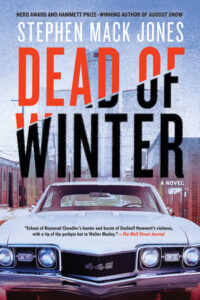
Stephen Mack Jones, Dead of Winter
(Soho)
Stephen Mack Jones’s August Snow series has been a true revelation for detective fiction, and in this, the third installment, the world just keeps getting richer and more nuanced and the writing more incisive. Here, Snow is approached by the head of a local institution, Authentico Foods, who is being strong-armed by an anonymous antagonist. Snow decides to help, and the investigation soon takes in a shadowy real estate operation and the attempted gentrification of Detroit’s Mexicantown. This is a crime novel that takes on big social issues with style and insight. –Dwyer Murphy, CrimeReads Editor-in-Chief

Kathy Wang, Impostor Syndrome
(Custom House)
This is the Silicon Valley spy novel we’ve all been waiting for, with a side order of biting satire and furious feminism. In 2006, Julia Lerner is an orphaned Muscovite with a computer science degree. 12 years later, she’s one of the most powerful women in Silicon Valley, sending sensitive information to her Russian handlers when she’s not busy crushing the competition to her social media company employer or being the keynote speaker on work/life balance at yet another conference. Things start to heat up when an underling stumbles on a suspicious use of data, and the two begin an epic game of cat-and-mouse with gasp-worthy consequences. –MO
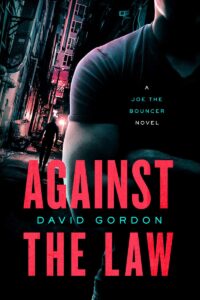
David Gordon, Against the Law
(Mysterious Press)
With his new “Joe the Bouncer” novel, Gordon has a unique and worthwhile series on his hands: a throwback to the wild crime series of the 70s from writers like Donald Westlake and Lawrence Block, writers who infused their crime capers with a kind of urbane wit that threaded together all the action. In Against the Law, Joe, still plying his trades as a strip club bouncer by night and a mob fixer by other times. takes on a job tracking down a mysterious heroin source. Pretty soon, he’s at the center of it all, the only man who can prevent a gang war erupting on city streets, and keeping the peace is going to require his skills as a former special ops man and, relatedly, a master thief. Gordon’s writing is consistently sharp and funny, and he conjures up a vivid, sleazy, exciting vision of New York. –DM

David Yoon, Version Zero
(Putnam)
David Yoon has crafted a whiz-bang thriller with vast implications for the internet era in Version Zero. An idealistic cog in Silicon Valley’s machine tries to keep his company on the straight-and-narrow with their user data, but instead finds himself without a job and unable to get a new one. He teams up with his will-they-or-won’t-they bestie and her California chill boyfriend to Fix The Internet, but when a tech billionaire with his own secretive agenda jumps in to offer unlimited resources, things start to go south very quickly. –MO
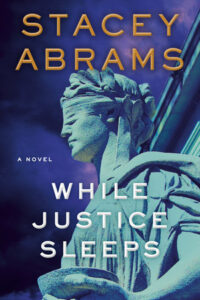
Stacey Abrams, While Justice Sleeps
(Doubleday)
Stacey Abrams is known for crafting delicious romance novels when she’s not campaigning for voter rights, but 2021 brings a special treat: her first ever legal thriller!!! A young law clerk for an enigmatic Supreme Court Justice finds herself in the midst of intrigue and danger as she tries to carry out a seeming-wild-goose-chase after her mentor ends up comatose. She forms an uneasy partnership with the judge’s estranged son, as the two race against time to find the culprit behind the dastardly deeds. Action-packed and full of good people doing badass things! –MO

Mia P. Manansala, Arsenic and Adobo
(Berkley)
Mia P. Manansala won the Eleanor Taylor Bland Award from Sisters in Crime for her early work on her debut, and I couldn’t be happier to see her creative new cozy series come to fruition. In Arsenic and Adobo, Manansala has all the ingredients for a fantastic culinary cozy—a recently returned daughter, meddling relatives, a failing restaurant, and a dead restaurant critic. Also, try to read this one without ordering food online. I dare you. –MO
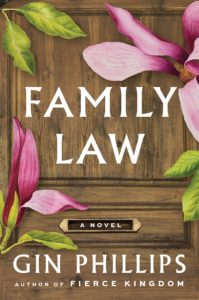
Gin Phillips, Family Law
(Viking)
Phillips Family Law is at once a thriller, a searing legal drama, and an intimate portrait of family life in flux. Set in 1980s Alabama, the story follows a lawyer and a young woman who comes into her orbit in an unexpected and intense way. Phillips evokes the era’a tensions with precision and power, but more than anything Family Law is a closely observed novel about friendship, closeness, and trauma. –DM

Natasha Pulley, The Kingdoms
(Bloomsbury)
Okay, so this one is really, really not a mystery, but I loved it too much to not include on this list. Also, it’s got mystery-esque elements to it! A man wakes up with no memory of his past life, in an alternate version of history where Napoleon won and the English have been enslaved by the French. He receives a postcard of a lighthouse, encouraging him to come home, and makes a pilgrimage to the remote Hebrides, where he discovers a portal to the past and, at last, the key to his identity. –MO
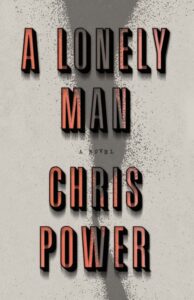
Chris Power, A Lonely Man
(FSG)
An apparently chance meeting in a bookstore launches the story of Chris Power’s intricate, searching debut. The meeting is between two Brits in Berlin, one a writer in search of his next book, the other claims to be a ghostwriter on the lam, hired to write a book for a Russian oligarch, a man who was shortly after killed. The bizarre tale connects the two, but in unusual ways, as both seem to be testing the other’s sense of reality, art, fiction, truth, and lies. A Lonely Man is an uncanny novel in the best sense possible. The mystery comes in readers efforts to untangle the many disorienting layers of narrative, asking themselves whether anything in this compelling world is authentic, and whether that’s the right question at all. –DM
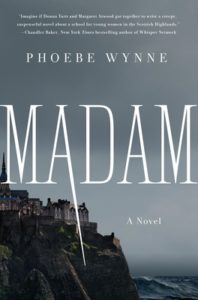
Phoebe Wynne, Madam
(St. Martin’s Press)
Madam reads like The Secret History if it had taken place in a far more appropriately gothic setting—a girls boarding school in the Scottish highlands, where a new classics teacher finds her embrace of modern education stymied by the school’s traditional outlook. And then, of course, there’s the question of what happened to the old classics teacher, and that question opens up other questions about the gothic secrets hidden within the school’s stone walls. Madam reads like a way more feminist version of Rebecca, and should be one of the most atmospheric and intense debuts of the year. –MO
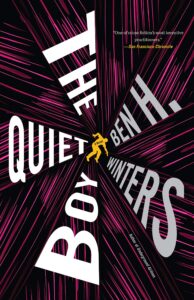
Ben Winters, The Quiet Boy
(Mulholland)
Ben Winters is know for his quiet, noir takes on science fiction and alternative history, but his latest goes in an entirely new direction as Winters looks at the long consequences of a botched medical procedure and explores the nature of vengeance. The Quiet Boy is split between two timelines and two legal cases: in 2008, a family sues a hospital for malpractice after their child’s health is damaged by a routine procedure, while ten years later, the family’s patriarch is now the one on trial: for the murder of a key witness from the first trial. –MO

Jean Hanff Korelitz, The Plot
(Celadon Books)
Jean Hanff Korelitz wrote the novel behind HBO’s new series The Undoing, and her newest novel promises to deliver just as many surprises. In this wickedly clever tale of stolen genius, a disappointed writer working at a dead-end job doesn’t expect much from his MFA students—at least, until one of them dies, leaving his MOST promising manuscript behind. It only takes a little tinkering for Korelitz’s narrator to pass off the masterpiece as his own. Will the literary world ever learn of its true authorship? –MO
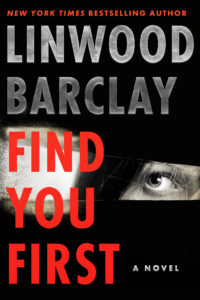
Linwood Barclay, Find You First
(William Morrow)
Linwood Barclay is a high-concept thriller writer, and his latest melds traditional mystery tropes and high tech possibilities as a dying millionaire seeks to find the children he fathered via sperm donation. Some, he worries, will inherit his rare genetic disease, while others may end up with a sizable chunk of his fortune. Meanwhile, his filmmaker daughter has been tracking him down, while his other scattered potential heirs are dropping like flies. –MO
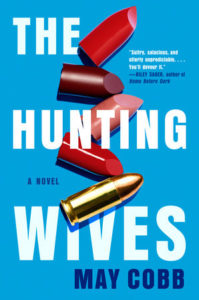
May Cobb, The Hunting Wives
(Berkley)
Who can resist a book dubbed “Big Little Lies meets Fight Club”? When Sophie O’Neill moves to rural Texas with her husband and child, she’s determined to fill her now-empty days with a lifestyle blog that’ll catapult to the height of influencer fame. Her husband’s job in the oil industry is lucrative, and soon Sophie falls in with a group of wealthy women who’ve formed a martinis-and-skeet-shooting club that promises excitement and relaxation in equal measure. Until, of course, the body of a teenage girl is discovered smack dab in the center of their target practice zone. –MO
___________________________________
JUNE
___________________________________

Cheryl Diamond, Nowhere Girl: A Memoir of a Fugitive Childhood
(Algonquin)
Cheryl Diamond’s childhood might have seemed envious, to an outsider, anyway. She and her family traipsed across the world, a never-ending adventure that later became an unceasing nightmare as Cheryl Diamond found herself unable to easily extricate herself from her fugitive family. Their travels were inspired not by wanderlust, but by the need to hide from Interpol and the shadowy machinations of Diamond’s maternal grandfather, a former spy who was incensed by Diamond’s con artist father. As the author grows up and assumes new identities, she finally finds her chance to break free of the the tug-of-war between her father and grandfather and find a life for herself. This memoir is proof that truth really is stranger than fiction. –MO

Christine Mangan, Palace of the Drowned
(Flatiron)
Mangan’s sophomore effort has all the subtle menace and heavy atmosphere of her debut, but with an even twistier plot. In her latest, we meet a washed-up novelist, dressed in cigarette pants and convalescing from a mental breakdown in Venice, where she is trying (and failing) to craft her next novel. Through a series of seeming coincidences, she forms an odd, and destructive, friendship with a Bright Young Thing dressed for Swinging London and ready to soak up her wisdom and steal her place in the sun. Add in some squatters in the palazzo next door and one of the worst floods in Venetian history, and you’ve got an instant classic of suspense. –MO
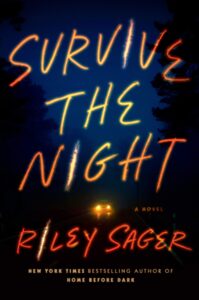
Riley Sager, Survive The Night
(Dutton)
Sager’s signature blend of campy homage and tense thrills is on full display in his new story of suspicion and doubt at 60 miles an hour. Film buff Charlie is in shock after the brutal murder of her charismatic roommate and not sure she can trust everything she sees. She’s got to get back home, but it’s the 90s, so she turns to the campus rideshare, where a clean-cut stranger offers her a ride. Charlie accepts, but immediately begins to regret her decision when she begins to suspect that the kind-hearted stranger may be the campus killer. After a game of 20 questions and a whole lot of Nirvana blaring, the action flares and you’ll find yourself racing to finish the book, just as Charlie races to get home. Oh, and in case you can’t tell already, Charlie is named for the character in Shadow of a Doubt. So, bonus recommendation just for that. –MO

Laurie R. King, Castle Shade
(Bantam)
In Laurie R. King’s latest installment of her long-running Mary Russell series, Russell and Holmes are headed to Romania to help out the nation’s beloved Queen Marie as the village around her summer home is plunged into a wave of vampire-fearing hysteria. It’s up to Russell and Holmes to allay the villagers’ superstitions and lay hands on the all-too-human culprit. –MO

Sujata Massey, The Bombay Prince
(Soho)
Sujata Massey brings us another stunning, intricate, and fast-paced historical mystery featuring her series sleuth, Perveen Mistry, the first and only female lawyer in 1920s India. Perveen Mistry has her work cut out for her as she works to investigate the mysterious death of a promising young student against the roiling backdrop of local protests and harsh lockdowns ahead of an impending visit from the British king. –MO
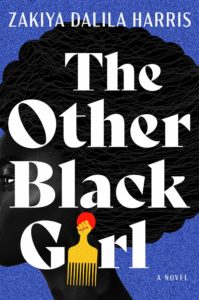
Zakiya Dalila Harris, The Other Black Girl
(Atria)
Zakiya Dalila Harris’s The Other Black Girl is a brilliant, twisty, and highly relevant thriller inspired by the author’s own experiences in working in the still very white world of publishing. An editor at a prestigious publishing imprint is elated when she finally gets another Black colleague, but her happiness quickly turns to confusion and trepidation when her coworker seems more interested in competing with her than helping her. Things get weirder when Harris’ heroine notices how strangely comfortable her colleague is in the white world, and starts getting notes on her desk telling her to leave the company—before it’s too late. Perfect for fans of Alyssa Cole’s When No One Is Watching, or Amina Akhtar’s #FashionVictim. –MO

Nekesa Afia, Dead Dead Girls
(Berkley)
I’m a big fan of Persia Walker’s Harlem Renaissance mysteries so I was psyched to see that Nekesa Afia is bringing the era back to crime fiction with her upcoming debut. In Dead, Dead Girls, waitress Louise Lloyd is working at two jobs—at a cafe and a speakeasy—and trying to forget her traumatic past. When young girls start turning up dead in a way that may be connected to her own near-escape from death years earlier, she must team up with a local detective to track down the killer, or fall under suspicion herself. I cannot wait to read this. –MO
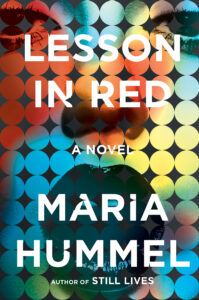
Maria Hummel, Lessons in Red
(Counterpoint)
Hummel’s last novel, Still Lives, was one of the most invigorating art world thrillers to come around in a very long time, and she’s back this year with a follow-up, Lesson in Red, that pushes that same story forward in provocative new ways. Maggie Richter is back in Los Angeles, poised to bolster the Rocque Museum’s reputation, when another death forces its way into her life, this time the death of a promising young art student. Richter ends up on a dark odyssey of the underbelly of L.A.’s contemporary art scene, which Hummel depicts in vivid, caustic detail. –DM
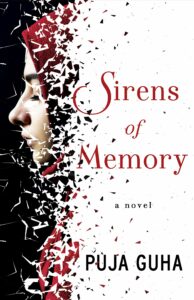
Puja Guha, Sirens of Memory (Agora)
Guha’s Sirens of Memory is a gripping and complex story that spans borders and eras, from the Iraqi invasion of Kuwait down to the modern day in the US. Mariam, a pregnant woman fleeing a violent marriage and the invasion, takes on another woman’s identity, the wife of an aid worker from India. Decades later, at a memorial event in the US, Mariam encounters that same man and is forced to reckon with the consequences of living under his wife’s identity all those years. –DM

Chris Offutt, Killing Hills
(Grove)
Offutt is overdue for a new breakout novel, and The Killing Hills may just be it, part southern gothic, part searching, seething portrait of loss and betrayal, and part an entertaining offshoot of the world of Justified. It’s set in the Kentucky hills, and when a military CID is enlisted by his sister, the town’s new sheriff, to help out with a shadowy homicide investigation, all hell breaks loose. A story full of feuds, rivalries, and crimes hiding in plain sight, The Killing Hills is as poignant and powerful as they come. –DM

Laura Lippman, Dream Girl
(William Morrow)
Laura Lippman took a break from fiction last year to publish a deeply thoughtful collection of essays, My Life as a Villainess. This year she’s back to standalone thrillers with Dream Girl, a book with “echoes of Misery,” according to the publisher’s description. A writer is recovering from an accident in his spare and hermetically sealed apartment, interacting only with his assistant and his nurse—that is, unless you believe the calls he’s getting from a character in his latest book are real…And then, of course, there’s the dead body he wakes up next to one morning. –MO

P.J. Vernon, Bath Haus
(Doubleday)
This book is so absurdly good. PJ Vernon has crafted a fast-paced thriller that will keep you reading long into the night. Bath Haus begins with a bored night in—Oliver Park is happily dating trauma surgeon Nathan, so why is he swiping through dating apps? Oliver’s boredom escalates to the point of visiting a local bathhouse hoping for a hookup, but what he gets instead is viciously attacked by a psychopathic Scandinavian. He can’t tell Nathan—it will ruin their fragile happiness, and convince Nathan that recovering addict Oliver is not to be trusted. But as Oliver makes a series of increasingly bad decisions while trying to hide the truth from Nathan, and Vernon peels back layer after layer to expose the power dynamics of their relationship, we realize that Oliver might be in more danger than even he realizes. –MO
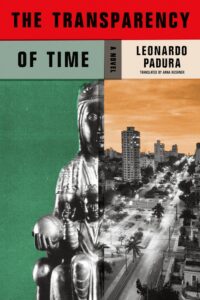
Leonardo Padura, The Transparency of Time
translated by Anna Kushner
(FSG)
From Padura, the crime fiction legend and giant of LatAm noir, comes a new Mario Conde novel, this one an epic occult history that leaps through time, place, and ideology to deliver one of the strangest, most alluring crime novels in years. Conde, now sixty and as ever full of disillusions and notalgia, receives a new client, a former Marxist turned Santeria practitioner who wants Conde to track down a powerful statuette, la Virgen de Regla. It seems like Padura is getting more ambitious with each book, and here he’s bent the structures of the crime novel into an investigation on the astral plane, one that also happens to be a revealing commentary on the state of modern Cuba and the world pressing in on it. –DM

Faridah Abike-Iyimide, Ace of Spades
(Feiwel and Friends)
Ace of Spades joins a host of hard-hitting YA fiction determined to examine the intersection of race, privilege, education, and oppression in the lives of young people. In Ace of Spades, two Black students attending an elite prep school uncover a vast, racist conspiracy that threatens to undo their entire futures. A conspiracy thriller with more than a hint of the truth, Ace of Spades is perfect for readers of all ages. –MO
John Galligan, Bad Moon Rising
(Atria)
Galligan’s latest “Bad Axe County” novel is a heady combination of brooding meditation and adrenaline-fueled action, as this remote Wisconsin outpost sees a potential serial killer back in action during a brutal heat wave. Local law enforcement and a Vietnam vet turned crusading local journalist join into the investigation, as the community reckons with just how sinister a villain they have on their hands. Galligan writes swift, atmospheric prose that will keep the pages turning. –DM

Natsuko Imamura (Translated by Lucy North), The Woman in the Purple Skirt
(Penguin Books)
Don’t be dissuaded by the loneliness of the main character—The Woman in the Purple Skirt is a defiant and hysterical ode to the power of the woman alone. The Woman in the Yellow Cardigan watches the Woman in the Purple Skirt as she drifts through their neighborhood, conspicuous in her apartness, an object of children’s fear and adults’ admonishments. The Woman in the Purple Skirt is, in effect, everything the Woman in the Yellow Cardigan would like to be—she is noticed. She is feared. And thus, she is powerful.
The Woman in the Yellow Cardigan gets the Woman in the Purple Skirt a job in hospitality, and witnesses her slow blossoming into a friendlier, more confident and approachable version of herself. And the Woman in the Yellow Cardigan continues to watch as the Woman in the Purple Skirt’s newfound confidence gets her into more and more trouble… –MO
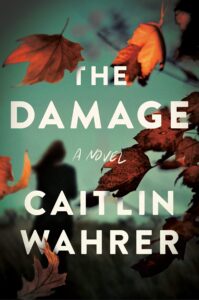
Caitlin Wahrer, The Damage
(Viking)
A seemingly perfect family is shattered by a horrible crime in this intense new thriller grappling with trauma, responsibility, and the meaning of masculinity. Nick is Tony’s younger brother, but Tony’s feels responsible for him like a parent—after all, it was Tony’s early intervention that saved Nick from the abuse and neglect of their father. Now Nick’s in college, and it’s Tony, not Nick’s parents, that gets the call to come see his brother at the hospital, where he’s undergoing exams after being assaulted by an older stranger. Their bond is strained by the attack and its aftermath, but not until the culprit is found, then looks likely to mount a strong defense, do things come truly untethered, as Tony is torn between helping his brother heal and giving in to the urge for violent restitution. Tony’s wife Julia, plain and calm in comparison to her hothead husband, is one of the most interesting characters I’ve come across, and the ending was genuinely surprising. –MO

Jonathan Lee, The Great Mistake
(Knopf)
Lee’s captivating new novel is at once an historical fiction, a mystery, a speculative investigation, and an ode to a city. His subject is Andrew Haswell Green, the man in large part responsible for so many of the public monuments and institutions that now define New York in the cultural imagination, from the Public Library to the Met. He was a truly public man, gunned down on his own doorstep at age eighty-three, a seemingly senseless killing that brought headlines and more than a few questions. Lee takes that murder as a jumping off point, diving into Green’s interior life with tremendous skill, telling an unforgettable story about the parallel construction of an identity and a metropolis. –DM
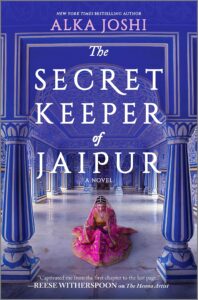
Alka Joshi, The Secret Keeper of Jaipur
(Harlequin)
In the follow-up to Alka Joshi’s well-received novel The Henna Artist, it’s 1969, and the artist’s protege, Malik, is headed to Jaipur, the city of his youth, to help build a movie palace. When a balcony collapses in the beautiful new building, causing untold damage and harm, Malik suspects sabotage, and sets out to find the culprit behind the supposed “accident”. Lush and richly detailed, Joshi’s latest work is perfect for armchair travelers and historical fiction fans alike. –MO
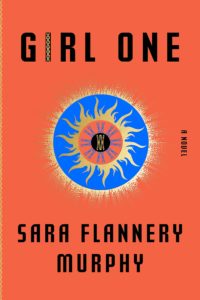
Sara Flannery Murphy, Girl One
(MCD)
This is the superhero take on 1970s feminism that we never knew we needed—and after reading it, I’m a bit shocked it hasn’t been done before! In Sara Flannery Murphy’s Atwood-esque thriller, nine women give birth on the “Homestead” without any contributions from men (except, of course, the mysterious male scientist tracking their progress). After the Homestead burns down, the women scatter. Decades later, their daughters must combine forces and develop their strange powers when they find themselves under attack from a menacing stalker. –MO

Gabriel Krauze, Who They Was
(Bloomsbury)
By day, Krauze’s narrator is a student at uni, going to parties and talking about literature. By night, he’s an agent of chaos running about the streets of London with his gang of thieves and dealers. Based on the author’s own experiences, Who They Was will make you question your assumptions about the underworld and serves a trenchant warning not to judge, and a beautiful reminder that people can change, and that a person is more than their best or worst moments. Gritty, hardboiled, and as noir as they come, but infused with a glimmer of hope. –MO
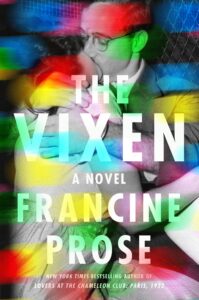
Francine Prose, The Vixen
(Harper)
In Francine Prose’s cutting satire of mid-century New York publishing, a young man whose mother was once friends with Ethel Rosenberg is hired as an editor to a prestigious publishing firm upon the recommendation of his generous, and venial, uncle. He soon is handed his first editing assignment: an atrociously crafted thriller featuring Ethel Rosenberg as a Soviet femme fatale, written by a vampish Manhattan princess locked up in an insane asylum. How can he avoid betraying his mother’s friend, without losing his job? And could there be more at stake than just a single, badly written potboiler? –MO
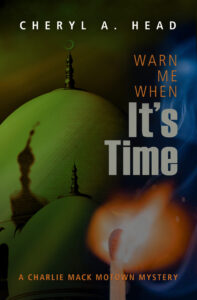
Cheryl Head, Warn Me When It’s Time
(Bywater Books)
Charlie Mack is back! And this time, she and her trusty detective agency are investigating some truly heinous white supremacists. After an Imam is killed in a fire by a hate group attacking mosques and Black churches all around Michigan, his family hires Charlie’s team to track down the culprits, convinced they’ll do a better job than law enforcement. What Charlie Mack discovers, however, goes much further than just a few right wing radicals—there’s a conspiracy going all the way to the top. –MO
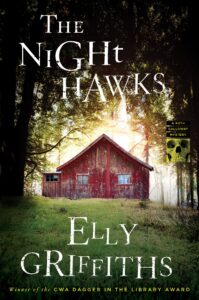
Elly Griffiths, The Night Hawks
(HMH)
Maybe it’s just because my dad keeps recommending The Dig, but archeologists seem to be having their biggest moment since Rachel Weiss played one in The Mummy. Crucial to the cultural legacy of the fictional archeologist is Elly Griffiths’ Ruth Galloway, who returns for another installment of the best-selling series. This time, she’s up against a group of meddling amateur archeologists known as the “Night Hawks” who’ve discovered a treasure of Bronze Age artifacts on a beach—right next to a washed-up dead body. –MO
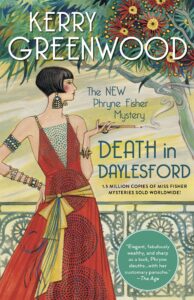
Kerry Greenwood, Death in Daylesford (Poison Pen Press)
AND WE’RE BACK! After a SEVEN YEAR HIATUS, Kerry Greenwood has given us another glorious, glamorous Miss Fisher novel!! Our heroine is just as we left her, plucky and dazzling in 20s Melbourne, in this story that takes her to a retreat for shell-shocked WWI veterans. She and her faithful companion Dot can’t imagine they’ll be there too long, but then there is a disappearance… and then a murder! –Olivia Rutigliano, CrimeReads Assistant Editor
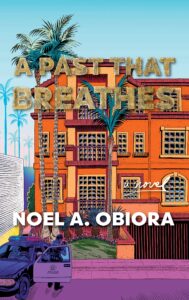
Noel Obiora, A Past That Breathes
(Rare Bird Books)
Legal thrillers are experiencing a revival as authors repurpose their format to dissect the limits of the justice system rather than placing faith in its apparatus, and A Past That Breathes is an urgent and timely addition to the new pantheon of the courtroom novel. Set in 1995, Noel Obiora’s debut begins with the murder of a prominent Los Angeles musician. Her Black ex-boyfriend is quickly arrested and looks to be soon railroaded for the crime, unless two young attorneys can show he’s being framed. Obiora’s decision to set the novel in 1990s LA allows for a nuanced and deeply resonant exploration of racism in the American justice system. –MO

James Ellroy, Widespread Panic
(Knopf)
Ellroy continues his biting, uproarious, sleaze-drenched interrogation of 1950s Los Angeles, now from the perspective of Freddy Otash, who’s either a bent cop, a private eye, or tabloid muscle, depending on who’s paying for him on a given night. Ellroy’s alternative histories of Los Angeles always give you the feeling of tapping into the veins of a dark monster, and this one’s no exception. –DM

Tracy Clark, Runner (Kensington)
Tracy Clark’s Cass Raines, an ex-cop-turned-private eye who fights for justice and for her community, is one of my favorite new characters of the past few years, and her latest installment, Runner, keeps the series going strong. Cass Raines is searching desperately for a teenage girl gone missing in a harsh Midwestern winter, but she’s not the only one looking. And the other interested parties don’t have the girl’s best interests at heart. –MO

Heather Levy, Walking Through Needles
(Polis)
Levy’s debut novel is a visceral, captivating story full of old secrets, demons, and trauma, set in an Oklahoma landscape that serves as a sharp complement to the character’s hardscrabble existence. Sam Mayfair is a survivor, someone who’s tried to leave behind her old town and the sexual assault that put such a dark stamp on her childhood. When her assaulter is killed and her step-brother named as the prime suspect, she has to return and confront her past, but finds out just how much she really wants to keep away from the scrutiny of others. Walking Through Needles is a poignant story and an auspicious debut. –DM

Laura McHugh, What’s Done In Darkness (Random House)
Laura McHugh has been reinventing the rural noir to tell women’s stories, and her latest is a harrowing venture into a deeply religious community hidden in the Ozarks. Sarabeth left her insular and oppressive hometown five years earlier after being kidnapped, beaten, then mysteriously released a week later. She finds her semblance of peace disrupted when law enforcement comes knocking on her door—there have been a rash of disappearances near her old county, and Sarabeth might know something about what’s happening to those girls. Soon, she’s drawn into a search that will force her to do the one thing she swore never to do: return home. –MO
___________________________________
JULY
___________________________________
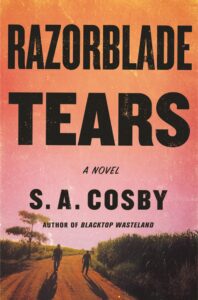
S.A. Cosby, Razorblade Tears
(Flatiron)
S.A. Cosby blew us away with last year’s searing heist thriller/rural noir Blacktop Wasteland, and with Razorblade Tears he’s done it again. In a heartbreaking tale of love, murder, vengeance, and acceptance, two ex-cons, one Black and one white, team up to find those responsible for the death of their sons, who were married to each other. Both fathers are grieving not only for their lost loved ones, but for their inability to overcome their own homophobia while their sons were still alive. And as they seek revenge, they also find a new path towards tolerance. Shattering and beautiful, this is a must-read for genre and literary fiction fans alike. –MO
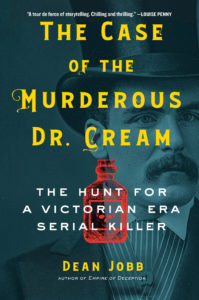
TRUE CRIME SPOTLIGHT
Dean Jobb, The Case of the Murderous Dr. Cream: The Hunt for a Victorian-Era Serial Killer
(Algonquin)
In Dean Jobb’s latest historical crime study, he takes on corruption, incompetence, and scientific advance in Victorian society, told through the lens of a chilling and fascinating story, the trial of one Dr. Thomas Neill Cream. Cream preyed upon Victorian ladies with mysterious illnesses and left a trail of poisoned patients in his wake, making him one of the era’s deadliest serial killers. Jobb’s narrative is built around his 1891 trial in London, but with a deft touch he takes on big ideas about the medical profession, forensics, and the tearing of the social fabric. Jobb’s true crime stories are not to be missed. –DM
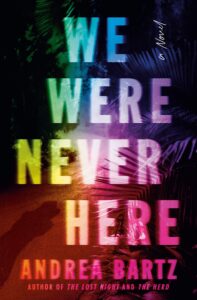
Andrea Bartz, We Were Never Here
(Ballantine)
We’ve been fans of Bartz since her debut here at CrimeReads, but We Were Never Here shows a new mastery of the genre and a sly commitment to keeping us guessing just a little bit. Bartz is the queen of ambiguously guilty female leads, but she’s outdone herself with the two women at the center of her latest: best friends, travel buddies, and now partners in crime. As the book begins, the two are finishing up an idyllic vacation, but darkness lurks in the recent past: the year before, the narrator killed a wannabe rapist in Cambodia, and her best buddy helped her cover it up. So what are the odds that something like that could ever happen again? Bartz will leave you guessing in the best possible way! –MO
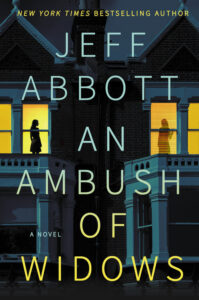
Jeff Abbott, An Ambush of Widows
(Grand Central)
Jeff Abbott first made a name for himself with action-packed thrillers, then turned to the slow burn storytelling of domestic suspense. And now, for the first time, he’s united the two in his new novel An Ambush of Widows. When a cybersecurity expert and a multimillionaire tech genius are found dead together in Austin, their widows must team up to solve the crime, or be considered as suspects themselves. –MO

Owen Matthews, Red Traitor
(Doubleday)
Yeah, okay, Cold War politics were not great, but they did give us one hell of a submarine thriller in The Hunt for Red October (Sean Connery AND Tim Curry as Russians? Alec Baldwin as Jack Ryan? You can’t get weirder or more 90s than that). And now, the submarine thriller is back! Or should we say….resurfaced? Owen Matthews is here with his own tense, claustrophobic tale of underwater woes, set at the peak of the Cuban Missile Crisis. –MO
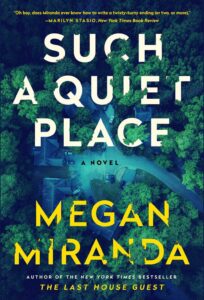
Megan Miranda, Such a Quiet Place
(Simon & Schuster)
Megan Miranda’s latest psychological thriller is being pitched as Rear Window meets Amazon’s Ring, as a neighborhood grapples with the possibility that one of their own—strongly implicated in a murder through footage collected by doorbell cameras—may have, in fact, been innocent all along. Which means there’s another murderer lurking around their quiet neighborhood…and what will that do to the property values?!?! No one captures suburban suspense better than Miranda, and Such a Quiet Place may well be her best so far. –MO
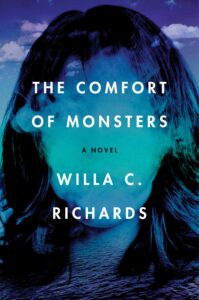
Willa C. Richards, The Comfort of Monsters
(HarperCollins)
Decades after her sister Dee’s death, Peg McBride is still searching for justice. She’s always suspected her sister’s ex, but the body’s never been found, and police distracted by a local serial killer never properly investigated the disappearance. Her mother is dying, and seeks comfort in a psychic who unleashes a torrent of memories from Peg’s past. As Peg unearths more and more about the events leading up to Dee’s disappearance, she finds herself caught between fury, guilt, and acceptance. Delicate and heartrending. –MO

Mikita Brottman, Couple Found Slain: After a Family Murder
(Henry Holt and Co)
This is the second book to come out this year about schizophrenia, family murder, and institutional incarceration (the first being Vince Granata’s heartbreaking memoir Everything Is Fine), yet the two seem almost diametrically opposed when it comes to their exact subject matter (and their subjects). In Couple Found Slain, Mikita Brottman follows the decades-long institutionalization of Brian Bechtold, convicted as a youth for the double murder of his parents during a schizophrenic episode, in a book that reads as the nonfiction version of One Flew Over The Cuckoo’s Nest. Bechtold and the authorities tell the same story when it comes to Brian’s early life and crimes, but in his long afterlife in a maximum security state psychiatric hospital, the narratives diverge considerably, as Brian resists high levels of medication, citing his own stability, and doctors view that resistance as further proof of Brian’s continuing need for high doses of medication. Interludes include the complete mental breakdown of one of the institution’s few resident physicians after he is suspected of experimenting on his patients without their consent. –MO

Samira Sedira, People Like Them
translated by Lara Vergnaud
(Penguin Books)
Samira Sedira’s newly translated novel is inspired by a real case in France in which race was an obvious factor but ignored by the media. In People Like Them, a glamorous mixed-race family move to a small rural community, where they proceed to befriend, then defraud, many of their new neighbors. One of those neighbors then commits a disproportionate act of monstrous violence sparked far more by his own racism and jealousy than any money owed to him. This is a tale of the violence and prejudice that rears its head in the form of exponential punishment for small sins—an unbearably familiar narrative across the world today. –MO

Daniel Silva, The Cellist
(Harper)
Art restorer and spy Gabriel Allon returns, this time seeking answers after a Russian billionaire falls prey to a sophisticated poisoning attack. Daniel Silva is a master craftsman of the espionage thriller, and we’re looking forward to following along as Allon races across Europe in pursuit of a mysterious musician in possession of dangerous secrets.
Dea Poirier, After You Died
(Agora)
After You Died is an intense, powerfully written story that combines elements of gothic fiction, the supernatural, and the psychological thriller in perfect balance, tracing the story of a bisexual teen, Asher, who’s locked up in a reform school following a crime he doesn’t remember committing. His interior world is a swirl of chaos, and outside the reform school walls he has only his twin sister to confide in, the only one who believes him. Poirier builds an incredible sense of dread and longing through the story, delivering a novel that will haunt you for a long time afterwards. –MO
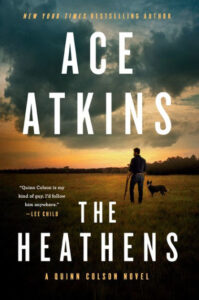
Ace Atkins, The Heathens
(Putnam)
The latest installment in Atkins’ Tibbehah County series focuses on TJ Byrd, one of the younger members of an outcast clan and a girl who’s about to get pinned with her mother’s murder. Byrd flees, but she has Quinn Colson, familiar with trouble, believing her story and launching an investigation into what really happened. Atkins brings the usual crisp writing and entrancing storytelling to The Heathens, a portrait of generational divides and the unexpected bonds that bridge them. –DM
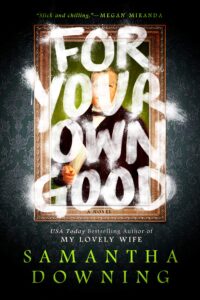
Samantha Downing, For Your Own Good
(Berkley)
Dark Academia gets a new twist in Samantha Downing’s latest thriller, For Your Own Good, set at an ultra-competitive school where one teacher will do virtually anything to ensure his students succeed, including taking care of their nasty little competitors and interfering parents. Delightfully vicious, and just what we’ve come to expect from Downing. –MO

Liv Constantine, The Stranger in the Mirror
(Harper)
I do love a good amnesia thriller, and The Stranger in the Mirror sounds like one of the best. Two years after she was found by the side of the road missing all her memories, Addison is getting ready for her wedding to the perfect guy, but she’s not sure she should go through with it without trying to find out more about her own past. Meanwhile, a grieving husband with a young daughter tries to figure out what happened to his missing wife. Did she leave on her own? Or was she taken? And why hasn’t she come back? –MO

Louise Candlish, The Other Passenger
(Atria)
Candlish brings a Hitchcockian sense of the uncanny to her latest thriller, which features two friendly neighbors, co-commuters on the local ferry. When one of them goes missing, the other finds himself under accusation. Their friendship is real, but our protagonist is forced to question everything he thought he knew about his relationships and the community around him. –DM
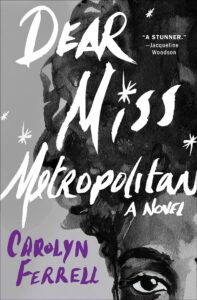
Carolyn Ferrell, Dear Miss Metropolitan
(Henry Holt and Co)
Carolyn Ferrell’s haunting novel of captivity and trauma is as lyrical as it is horrifying. Dear Miss Metropolitan tells the stories of three women held as sex slaves by a violent drunkard for over a decade, interwoven with narratives of their childhoods and their long path towards healing after finally gaining their freedom. Neighbors, nurses, and family all make their appearance as well, for a kaleidoscopic picture of fractured lives and the power of community. A gorgeous and essential work that earns its comparisons to Ivy Pochoda’s These Women and Emma Donoghue’s Room. –MO
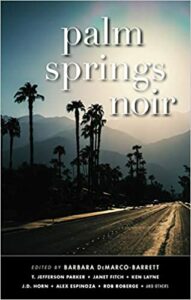
Palm Springs Noir, edited by Barbara DeMarco-Barrett
(Akashic)
Palm Springs has a storied history as idyllic getaway for the stars, but there’s plenty of seediness and long-simmering tensions for the authors to explore in the latest from Akashic’s City Noir series. (As a side note, there are now enough noir collections for California cities to plan an entire road trip around them).
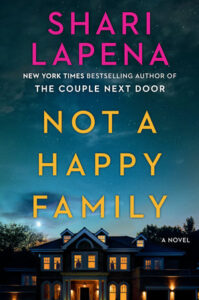
Shari Lapena, Not a Happy Family
(Pamela Dorman)
Bestselling author Shari Lapena knows a thing or two about secrets, and in Not a Happy Family, everyone’s got them—even the dead. When a wealthy couple is murdered the day after a contentious Easter dinner with their estranged offspring, their kids become instant millionaires—that is, unless it turns out that they’re the ones responsible for the murder. Strong Menendez Brother vibes with this one. –MO
___________________________________
AUGUST
___________________________________

Paula Hawkins, A Slow Fire Burning
(Riverhead)
Hawkins is fascinated with liminal spaces—those areas that are concerned with travel or transition. After her highly successful debut, The Girl in the Train, she then headed to the marshes for her sophomore novel, Into the Water, and now, in August’s upcoming release, she takes to the river with a murder on a houseboat. Three women have equal cause for revenge against the victim, and Hawkins eschews the usual red herrings to keep readers guessing till the end (that’s what I predict, anyway!). –MO
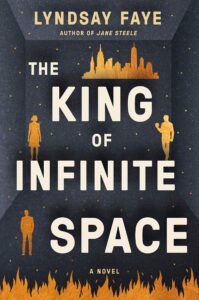
Lyndsay Faye, The King of Infinite Space
(Putnam)
I think it’s safe to say that we all hope Lyndsay Faye will never stop cleverly re-imagining landmarks of literature. The King of Infinite Space is a clever pastiche of Hamlet taking place in New York City, uniting mystery, fantasy, and slings and arrows of outrageous fortune. –OR
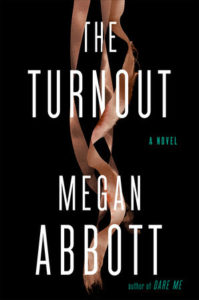
Megan Abbott, The Turnout
(Putnam)
Megan Abbott has already written about the high-stakes (and highly dangerous) sports of cheerleading and gymnastics, and now she turns her attention to the world of ballet. Abbott is not only a suspense author at the top of her game, she’s also a scholar, and The Turnout promises to be both homage to classic tropes and visionary model for their evolution. In this semi-gothic tale of a family-run ballet studio, two sisters teach the classes while their injured brother runs the office. Their parents died in a suspicious accident over a decade earlier, but suspicions and resentments need the arrival of an interloper, as well as a ballet season beset by disaster, in order to be let loose in their fully monstrous forms. –MO
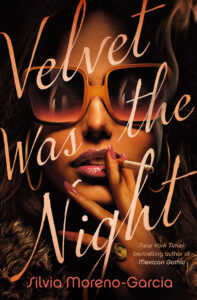
Sylvia Moreno-Garcia, Velvet Was The Night
(Del Rey)
Sylvia Moreno-Garcia dazzled me with her fungal-punk horror novel Mexican Gothic, and I couldn’t wait to dive into her 1970s-set political noir, Velvet Was The Night, a new twist on the classic set-up of Ordinary Person Caught Up in Extraordinary Circumstances. Maite is a secretary whose only passion in life is reading romance magazines—at least, until her beautiful neighbor Leonora dumps her cat on Maite, then disappears entirely. On the hunt for Leonora to return the cat, Maite finds herself pulled into the student movement and leftist politics, as bloody right wing enforcers also search for the missing student, and grow increasingly interested in Maite herself. –MO
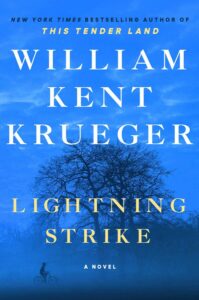
William Kent Krueger, Lightning Strike
(Atria)
William Kent Krueger, who wowed us with his last offering, the epic This Tender Land, is back this summer with a new novel in the Cork O’Connor series, only this time around we’re thrown into a deeply felt origin story. The setting is a familiar Minnesota, but we’re in the summer of 1963, and Cork is a small boy exploring the northern woods, when he happens upon a body. He’s shaken by the discovery—the dead man is someone he knows well—but also inspired to action, as he conducts his own investigation right beside the one his father, the sheriff, is conducting. The era’s small-town life is conjured up in sharp detail, but there’s also the distinct feeling that change is coming, a sweeping change bigger than any one family, and destined to alter the course of the community. –DM
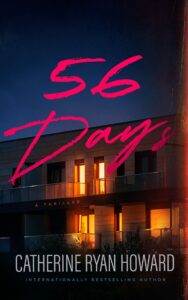
Catherine Ryan Howard, 56 Days
(Blackstone)
Catherine Ryan Howard has written, if not the first thriller about the pandemic, then certainly the first good one. In Howard’s latest, two lonely people meet in a checkout line in Dublin just before lockdown, then decide to hole up together for what they assume could only be for a short while. 56 days later, one of them is dead. Howard structures her novel as a clever sort of countdown, dishing out slow reveals about each of the characters, until the shattering ending that I might label Tarantino-esque if it weren’t so intimate. –MO
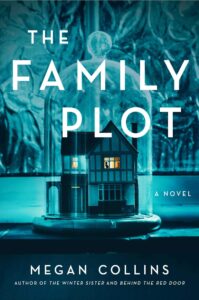
Megan Collins, The Family Plot
(Atria)
Megan Collins’ new true crime gothic has everything—a family obsessed with honoring the murdered, a mother who acts out death scenes, a father who silently hunts each day in the woods, a missing son, his lost twin sister, their mordant siblings, and a fateful family reunion that begins with the discovery of a mystery skeleton in plot meant to be their father’s grave. –MO
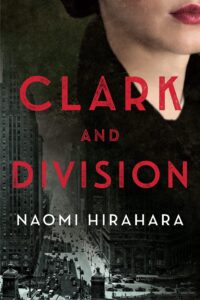
Naomi Hirahara, Clark and Division
(Soho)
Naomi Hirahara is best known for her Mas Arai mysteries, set in California, but for her new book, she heads to Chicago (with an endorsement from the Doyenne of Chicago Crime, Sara Paretsky) for a perfectly-crafted and intensely atmospheric historical murder mystery set in the displaced Japanese-American community resettled to Chicago after being released from WWII internment camps. –MO

Chandler Baker, The Husbands
(Flatiron)
In Chandler Baker’s delightful and furious take on Stepford Wives, the situation is reversed—a family moves to a selective new housing development in the suburbs of Austin where husbands do an enormous amount of helping around the house. It might even be suspicious, if it weren’t so nice to see for a change. While Baker’s narrator loves her red-blooded American husband, she wouldn’t mind it if he picked up the laundry every once in a while. Yet the suspicious death of one of her new neighbors in a house fire, coupled with the local male population’s willingness to discuss Tide pens, pushes her towards some investigating of her own. –MO
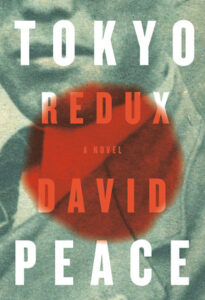
David Peace, Tokyo Redux
(Knopf)
David Peace returns to post-war Japan for a pitch-black noir about missing persons, international coverups, Douglas Macarthur, and the 1964 Olympics. Split between three timelines—the Occupation Era, the early 60s, and the 1980s—and written in Peace’s signature brutalist, post-modern style, Tokyo Redux looks to be the most stone-cold crime novel of 2021. –MO
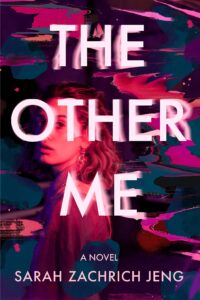
Sarah Zachrich Jeng, The Other Me
(Berkley)
Kelly’s celebrating her birthday at her bestie’s art show in Chicago, living her best life, when she heads to the bathroom and instead walks through the door into a nightmarish version of her own life, one in which she never went to art school and is happily married to a former high school classmate she barely remembers. What happened to her perfect life? And how did she get trapped in someone else’s fantasy? The Other Me works as both a suspenseful psychological thriller and an astute reinvention of the time travel narrative. –MO

Richard Chizmar, Chasing the Boogeyman
(Gallery)
In 1988, Richard Chizmar returned from college to his sleepy hometown only to find the bucolic paradise transformed by terror as a serial killer stalked the streets. He turned his experiences as a horror writer living in the midst of real-life horror into this remarkable work of metafiction, and now, decades later, new details have emerged about the case, prompting a new edition of the classic book. Small Town America, get ready to be shocked by whodunnit. –MO

Louise Penny, The Madness of Crowds
(Minotaur)
While the entire Gamache series is undoubtedly some of the finest mystery tales ever created, Louise Penny’s latest is a small masterpiece all on its own. In this timely and complex novel, the Inspector is asked to provide security for a speaker at a nearby university. When he learns of the speaker’s atrocious politics, he refuses the commission, setting in motion a lengthy debate over academic freedom and the meaning of hate speech that soon devolves into murder. Three Pines has never faced such existential challenges as it will encounter in The Madness of Crowds. –MO

Zoje Stage, Getaway
(Mulholland)
Getaway feels like 127 Hours meets The Descent and I’m shocked that publishers are not using these comparisons already. In Zoje Stage’s latest delightfully disturbing novel, two best friends head into the Grand Canyon’s deepest recesses in an adventure that quickly becomes a nightmare. –MO

Kotaro Isaka, Bullet Train
(Overlook)
This book is so much fun!!! Bullet Train reads a bit like if Elmore Leonard was hired to adapt Murder on the Orient Express and it was directed by Bong Joon Ho. Several groups of criminals converge on on train headed from Tokyo to Morioka—an odd couple protecting a gangster’s son and a suitcase full of money, an odd job man with terrible luck who’s there to steal the suitcase, and a teenage psychopath facing off against the grieving father of a child he gravely wounded. Funny, action-packed, perfectly choreographed, and surprisingly moving! –MO
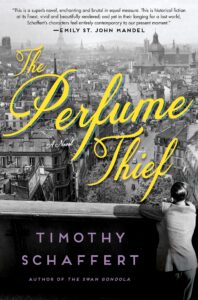
Timothy Schaffert, The Perfume Thief
(Doubleday)
This is the queer spy novel about WWII Paris that I never knew I needed and now could not possibly consider living without. Clementine, or Clem, a septuagenarian perfume artist dressed impeccably in men’s clothes, is sent on a mission by her songbird client to retrieve a book of perfume recipes key to reuniting the chanteuse with her parfumier father, in hiding from the Nazis. Elegant and elegiac, a paean to the Old Paris, or perhaps a Paris That Never Was, The Perfume Thief is perfectly pitched by the publisher as “A Gentleman in Moscow meets Moulin Rouge.” –MO
___________________________________
SEPTEMBER
___________________________________
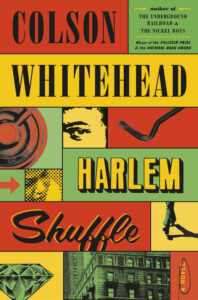
Colson Whitehead, Harlem Shuffle
(Doubleday)
After the soaring success of the Pulitzer Prize-winning The Underground Railroad, Whitehead is back this year with a crime novel of profound depth and complexity, set in 1960’s Harlem and focused on the life and ambitions of one Ray Carney, a furniture salesman who also moonlights in some casual fencing of stolen goods. The two activities serve two parts of Ray’s identity, the one respected, law-abiding, and on the rise, socially speaking; the other is his crook side, drawn in by a family of hustlers and himself vulnerable to that special thrill. He eventually falls in with a crew looking to pull a heist in Harlem’s most glamorous hotel, a job that gives Whitehead room to detail the Harlem era in meticulous, meaningful detail, bringing a kind of secret city into spectacular life. –DM

Richard Osman, The Man Who Died Twice
(Pamela Dorman/Viking Books)
Everybody loves The Thursday Murder Club. What is there NOT to love, I ask you? And now, thank HEAVENS, there’s a sequel! This is absolutely just the thing we all need right now. In this delightful new installment, our favorite quartet of clever seniors is back, and this time, they’re investigating a man from Elizabeth’s past. And smuggled diamonds, dangerous gangsters, and murder, of course. –OR

Rachel Howzell Hall, These Toxic Things
(Thomas and Mercer)
I’ve been a fan of Rachel Howzell Hall for years, and she just gets better and better with each book. Hall first tried her hand in traditional mystery with 2019’s All Fall Down, a fiery response and urgent retelling of Agatha Christie’s And Then There Were None, and These Toxic Things should be just as satisfying to fans of the Golden Age Revival. In her latest, a professional curator of digital scrapbooks is sad to hear of the suicide of a new client, and decides to finish her commission as a way to honor the elderly woman. The problem is, someone else wants to keep her client’s memories in the past, and will do anything to keep the scrapbook from coming together. –MO

Catherine Dang, Nice Girls
(William Morrow)
“Ivy League Mary,” the sullen protagonist of Dang’s Nice Girls, is recently expelled from her elite university and stuck working for minimum wage in her podunk hometown when her ex-friend-turned-it-girl disappears and a city-wide search commences. Another girl from the wrong side of town is also missing, and authorities seem unwilling to explore any connections between the two cases, so it’s up to Mary and her new friends to find out the real story behind the disappearances (that is, if Mary can check her privilege long enough to identify the culprit). –MO

Amanda Jayatissa, My Sweet Girl
(Berkley)
Hot damn this book is good. In Jayatissa’s nailbiter of a thriller, Paloma, adopted from a Sri Lankan orphanage, has been given everything to succeed by her wealthy American parents, and yet at 30, she’s floundering, both in her job and her personal life. When her roommate finds out her darkest secret, then shows up dead, things are bad enough. When the body mysteriously disappears, along with all evidence of his existence, Paloma must face her fears and dive deep into her past to understand her present-day dangers. –MO

Alice Feeney, Rock Paper Scissors
(Flatiron)
This one’s already been optioned, but I’d encourage everyone to read it before it heads to the screen. A couple heads to a remote retreat in the Scottish highlands, desperate to reconnect but wary of the lies they’ve told each other. Interspersed with their increasingly nightmarish weekend trip are letters written by a wife to her husband over ten years of marriage. The two dovetail towards an explosive conclusion that leaves us with just enough ambiguity to linger in the reader’s mind long after finishing. –MO

Julia Dahl, The Missing Hours
(Minotaur)
Julia Dahl has crafted a satisfying and thought-provoking revenge thriller in The Missing Hours. Claudia Castro is rich, beautiful, and envied. But when a heinous act is committed against her, her privilege is more of a weapon than a benefit. Who’s going to believe the trust fund party girl? And so, she seeks her brutal vengeance without the aid of police, accompanied by a neighbor with his own agenda. –MO
___________________________________
OCTOBER
___________________________________

Lori Rader-Day, Death at Greenway (William Morrow and Custom House)
I’ve been a fan of Lori Rader-Day since her first novel, and when I found out her new book was a historical novel featuring Agatha Christie’s holiday estate, I squeed. In Rader-Day’s first fictional foray into the past, a group of children shepherded by ill-trained nurses heads to Greenway to shelter from the Blitz. When a body is discovered nearby, and a murderer is deemed on the loose, the nurses begin to fear that their idyllic new refuge is just as dangerous as their city home. –MO
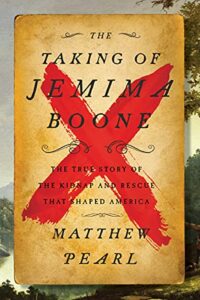
Matthew Pearl, The Taking of Jemima Boone: The True Story of the Kidnap and Rescue That Shaped America (Harper)
Most people associate 1776 with the signing of the Declaration of Independence and the Revolutionary war, but Matthew Pearl’s first book-length work of narrative nonfiction, hones another, forgotten chapter of the so-called founding of America: the colonists’ oppression of Native American tribes while they simultaneously fought for freedom against the British. This is the engrossing account of a little-known, but tremendous story from this time: that of the kidnapping of Daniel Boone’s daughter Jemima in 1776 by a Cherokee-Shawnee raiding party. But the raiders’ leader, Hanging Maw, wants to use Jemima as a bargaining chip to orchestrate peace between the Native Americans and the European settlers. But then Daniel Boone and his posse catches up with them. Also, if you think this sounds like Last of the Mohicans, you’re RIGHT. –OR


